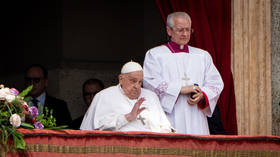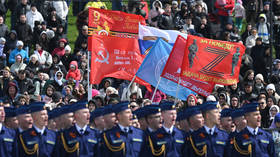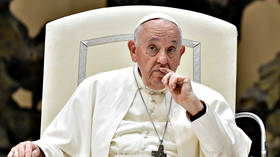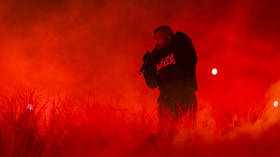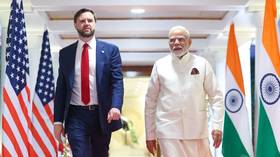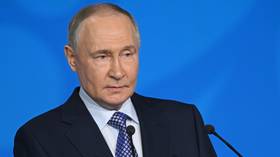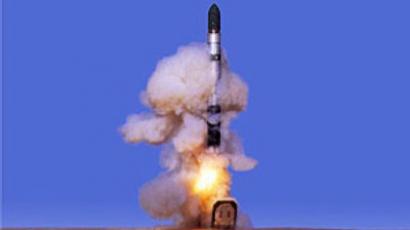Multipolar responsibility
Signing the new START Treaty, the US and Russia are also urging other powers to take up nuclear responsibility, says Mikhail Margelov, Chairman of the Foreign Affairs Committee in Russia's Federation Council.
He explained to RT about the implications it will have for global security.
RT: Good afternoon Mikhail Vitalievich, thank you for your time. The strategic arms reduction treaty is to be signed today on April 8. Is Russia satisfied with its results, because it is a well-known fact that any agreement is a compromise? What compromises has Russia agreed to?
Mikhail Margelov: I think that the current treaty which we are about to sign with our American partners is not just a compromise, but a compromise which satisfies both sides. It’s the fruit of joint, extended, hard work. It’s the fruit of not just agreements, but the result of many attempts to reach mutual understanding, to build up a system of docking mechanisms, which has not been working for the last five or six years, and to try to restart Russian-American relations. In other words, the meaning of this treaty is much bigger than just a piece a paper signed by two leaders.
RT: What would you call the main differences or rather advantages of the new strategic arms reduction treaty in comparison to the previous one, which expired in December last year?
MM: From my personal viewpoint, this treaty for Russia is the first brick in the foundations of a new architecture of European and international security, which was mentioned first by Russian President Dmitry Medvedev in June 2008 in Berlin. It’s the new architecture of global security which is discussed by everybody right now; it’s a system to which Russian suggested a draft of this treaty as one of the basics. So, to us, it’s a step forward in a new direction.
It’s important that the Russian-American treaty tallies up this era of nuclear arms. Nuclear arms are not up-to-date. The new world will be a world of other arms. The race of arms in the old way will be over soon. It’s the end of the era of annoying attempts to join the nuclear club on the part of those who did not belong to it. The two greatest nuclear powers say to all the other countries that have nuclear arms, or can have nuclear arms: we make this step forward to move away from a nuclear world. Look at us. Do as we do.
RT: The idea of complete disarmament, nuclear zero has been discussed a lot lately. In your opinion how realistic is that?
MM: In February this year, the so-called Global Zero Summit took place in Paris. It was an international meeting at a very high level dedicated to the ideas of nuclear disarmament. This summit was supported by the two presidents’ addresses – of President Medvedev and of President Obama. I suppose that if the Russian and American presidents were not taking seriously the idea of nuclear disarmament in the future, of course not in the near future, but in the long run, they would not have supported this initiative of civil society, parliaments, and politicians. In my opinion, responsible Russian politicians and responsible American politicians clearly understand that there was a time when we rejected chemical weapons, so one day we will be able to reject nuclear weapons too. But to do so we must do some hard and extended work. And we can see the result of such work – the Russian-American treaty which is to be signed in Prague.
RT: According to the new treaty, Russia and the US are reducing the level of mutual inspection and monitoring. Does this mean a new level of trust in the relations between the two countries?
MM: Undoubtedly so. By August 2008, the level of trust between Russia and America had fallen below zero, so taking off from that low point on the way to mutual trust and understanding was not that difficult. Another thing is that, if we are talking about a real reset of Russian-American relations, we need to talk about real changes in our interaction formats. If we trust yet still check and monitor each other, we need to do this by using modern methods, not just by keeping observers in Russia's Votkinsk and somewhere at America's remote test ranges. If we are modern people living in modern societies, we need to behave the modern way when it comes to arms reduction control.
RT: Is there a chance of other countries joining the new Strategic Arms Reduction Treaty?
MM: We would like to see that happen. As responsible powers, Russia and the USA are making the first step. We tell other, official and unofficial, members of the nuclear club, “Look at what we are doing. Follow our footsteps”. We realize the threats that the modern world is facing. We see today's world the way it is, and there should be no delusion that security in today's world can stay the way it used to be in the 1940s, ’50s, or ’60s. The world is totally different now. During the Cold War, there were two vertically-oriented blocs – the NATO and the Warsaw Pact – were opposing each other, and the world was black and white. Today, the world is a multicolor picture where there is no unipolarity or bipolarity. It is exactly the multipolar world that that has been discussed so much over the last two decades. It has come; it is there. Therefore, in a multipolar world, there should be multipolar responsibility: not only that of Russia and the USA, but also the responsibility of France, the Great Britain, China, India, Israel, and other states that have or may have nuclear weapons. They should tell this openly and honestly to their nations.
RT: Many experts think that the signing of the new START Treaty on the eve of the International Conference on Nuclear Disarmament may serve as a good example for third-party countries. Do you think this document will help the situation with North Korea's and Iran's nuclear programs?
MM: You know, Russia and our American counterparts hope very much for that. It is not by chance that we are giving out this signal to the entire world and making this powerful and very serious step (I mean the signing of the Treaty) on the threshold of the nuclear summit in Washington that is taking place on April 12-13. We would like to send out a message to all current and maybe future members of the nuclear club and call them to join us in the discussion of a new world, a world the way Presidents Medvedev and Obama see it. I repeat that in February, Mr. Medvedev and Obama supported the idea of “global zero” and sent welcome letters to the Global Zero Summit in Paris. Russia and the USA are tired of the arms race. We want to think about developing, not about restraining each other. The global financial crisis has been very convincing, I think. Any talks about sufficiency or insufficiency of the G7 or G8 format are simply not relevant anymore. It’s the G20 that we need to address the problems of today's world. Exactly the same is true about nuclear security. Efforts made by Russia and the US can only tip this situation off the dead center, but solving the problem is only possible through the efforts of all other countries.
RT: Russia and the USA are certainly making a big step towards each other. In your view, what lingering problems are there in relations between those two countries and which ones are most difficult?
MM: The main problem in Russia-US relations, both today and over the last 20 years, is the fact that after the disintegration of the USSR and the fall of the Berlin Wall, and again after the Cold War we have failed to develop a positive agenda for our bilateral relations. If we co-operate, we do so in matters that we co-operated on back in the 1970s, the détente years. But it’s high time we emerged from this vicious circle. How much longer can we engage in non-proliferation, Mid-East peace, and new challenges and threats alone? It’s high time we rose above all that. It’s high time we developed a totally different agenda. This is possibly the main problem and the main task we face as do the Russian and the American presidents. It is my great hope that both Medvedev and Obama, as representatives of new political generations that are not infected with the Cold War bacilli, are able to do that. It’s a breakthrough that either of the two presidents can make.



